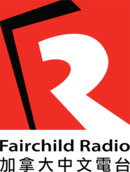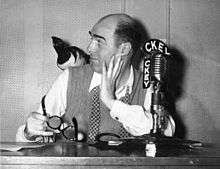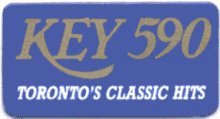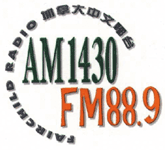CHKT
CHKT is a Canadian radio station, airing at 1430 AM in Toronto, Ontario. The station, owned by the Fairchild Radio service, airs Chinese language programming. CHKT's studios are located on East Beaver Creek Road in Richmond Hill, while its transmitters are located on the Toronto Islands.
 | |
| City | Toronto, Ontario |
|---|---|
| Frequency | 1430 kHz (AM) |
| Branding | Fairchild Radio |
| Programming | |
| Format | multilingual |
| Ownership | |
| Owner | Fairchild Radio (Fairchild Radio Group Ltd.) |
| Sister stations | Fairchild Television |
| History | |
| First air date | May 5, 1925 |
| Former call signs | CKCL (1925-1945) CKEY (1945-1991) CKYC (1991-1996) |
| Former frequencies | 840 kHz (1925-1931) 580 kHz (1931-1964) 590 kHz (1964-1995) |
| Call sign meaning | Canada Hong Kong Toronto |
| Technical information | |
| Class | B (regional) |
| Power | 50,000 watts |
| Links | |
| Website | www |
History

The station that was the indirect forerunner of CHKT first aired in 1925 as AM 840 CKCL, owned by the Dominion Battery Company. As with many radio stations in the early years of radio broadcasting, the station changed frequencies a number of times in its first years of operation. It settled on the permanent 580 kilohertz (then kilocycles) frequency in 1931.
In 1945, the station was sold to Jack Kent Cooke's Toronto Broadcasting Co., and adopted the callsign CKEY. It was subsequently acquired by Shoreacres Broadcasting, a consortium that included Westinghouse and The Globe and Mail, in 1961, and changed its frequency to 590 in 1964 as CKWW signed on at 580 that year in Windsor and CKAR, (known today as CFBK-FM), in Huntsville had to change its frequency from 590 to 630 kHz.
In the late 1950s and early 1960s, CKEY was the leading Top 40 music competitor to 1050 CHUM; one of its DJs was later CFNY staple David Marsden, known as Dave Mickie at CKEY (and later at CHUM as well). Another notable broadcaster was Bryan Fustukian, broadcasting as Vik Armen. The station dropped its Top 40 format for "middle of the road" music in 1965, now going up against CFRB, and was successful in that arena for a time. Shoreacres, in turn, was acquired by Maclean-Hunter in 1966.
A transmitter for CKEY was once located on Midland Avenue and Eglinton Avenue East in Scarborough. This site was sold to the Scarborough Board of Education in 1964 to build Tabor Park Vocational School for the area’s redevelopment.[1]
From 1970 to 1984, CKEY featured Charles Templeton and Pierre Berton on the commentary show Dialogue with Templeton also reading the morning news for several years. The station also had Stephen Lewis as a commentator in the late 1970s and early 1980s.

On January 1, 1984, CKEY flipped from its long running MOR format to soft rock/oldies as "Solid Gold CKEY", and on June 20, 1988, the station became "Key 590" with a full-blown oldies format, once again competing directly with a re-formatted CHUM. At 7 p.m. on March 14, 1991, CKEY signed off and began stunting with a heartbeat; the following morning at 9, the station adopted a country music format, changing its callsign to CKYC.[2][3][4] The CKEY callsign was subsequently picked up by a station in Fort Erie.
After Rogers Communications acquired Maclean-Hunter in 1994, CKYC was sold to Telemedia. Telemedia subsequently swapped CKYC's frequency with that of its sports outlet CJCL. On February 6, 1995, at 10 AM, CKYC ceased airing country music, and after stunting with a ticking clock for two hours, CJCL and CKYC swapped frequencies.[5][6] CKYC subsequently aired only syndicated programming until it went off the air permanently in late 1996. CHKT was launched by Fairchild Group in 1997, over the 1430 AM frequency that had been occupied by CKYC immediately prior to its signing off for the last time.[7]
The CKYC callsign was subsequently picked up by a station in Owen Sound, Ontario in 2001.

In October 2019, Fairchild Radio gained public attention when it fired a Toronto radio talk-show host allegedly because of his questions during an interview perceived as critical of the Chinese government's stance on the 2019–20 Hong Kong protests.[8]
Programming
CHKT airs mainly Chinese (Cantonese and Mandarin) language programming as well as programming in the following languages: Cambodian, Filipino, German, Hindi, Hungarian, Irish, Italian, Laotian, Macedonian, Punjabi, Russian, Thai, Urdu and Vietnamese.
References
- "Archived copy" (PDF). Archived (PDF) from the original on 2019-05-23. Retrieved 2020-04-22.CS1 maint: archived copy as title (link)
- "Archived copy". Archived from the original on 2016-12-20. Retrieved 2017-07-05.CS1 maint: archived copy as title (link)
- "Sound bite". rockradioscrapbook.ca. Archived from the original on 2016-12-20. Retrieved 2019-10-09.
- "Sound bite". rockradioscrapbook.ca. Archived from the original on 2016-11-15. Retrieved 2019-10-09.
- Government of Canada, Canadian Radio-television and Telecommunications Commission (CRTC) (October 9, 1996). "ARCHIVED - Decision CRTC 96-659". crtc.gc.ca. Archived from the original on October 9, 2019. Retrieved October 9, 2019.
- Blackwell, Tom (October 8, 2019). "Host on Chinese-language station in Toronto says he was fired for criticizing Beijing". National Post. Retrieved October 8, 2019.
External links
- Fairchild Radio
- Remembering CKEY Radio Toronto - 580 - 590
- CHKT history - Canadian Communications Foundation
- CHKT in the REC Canadian station database